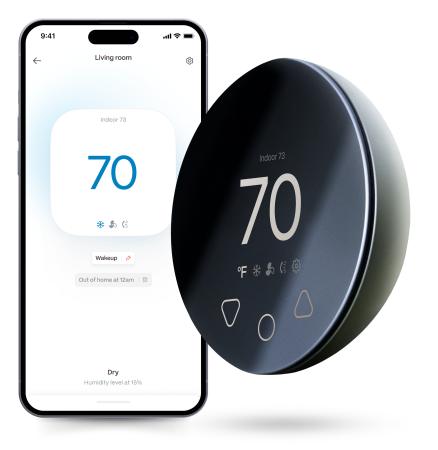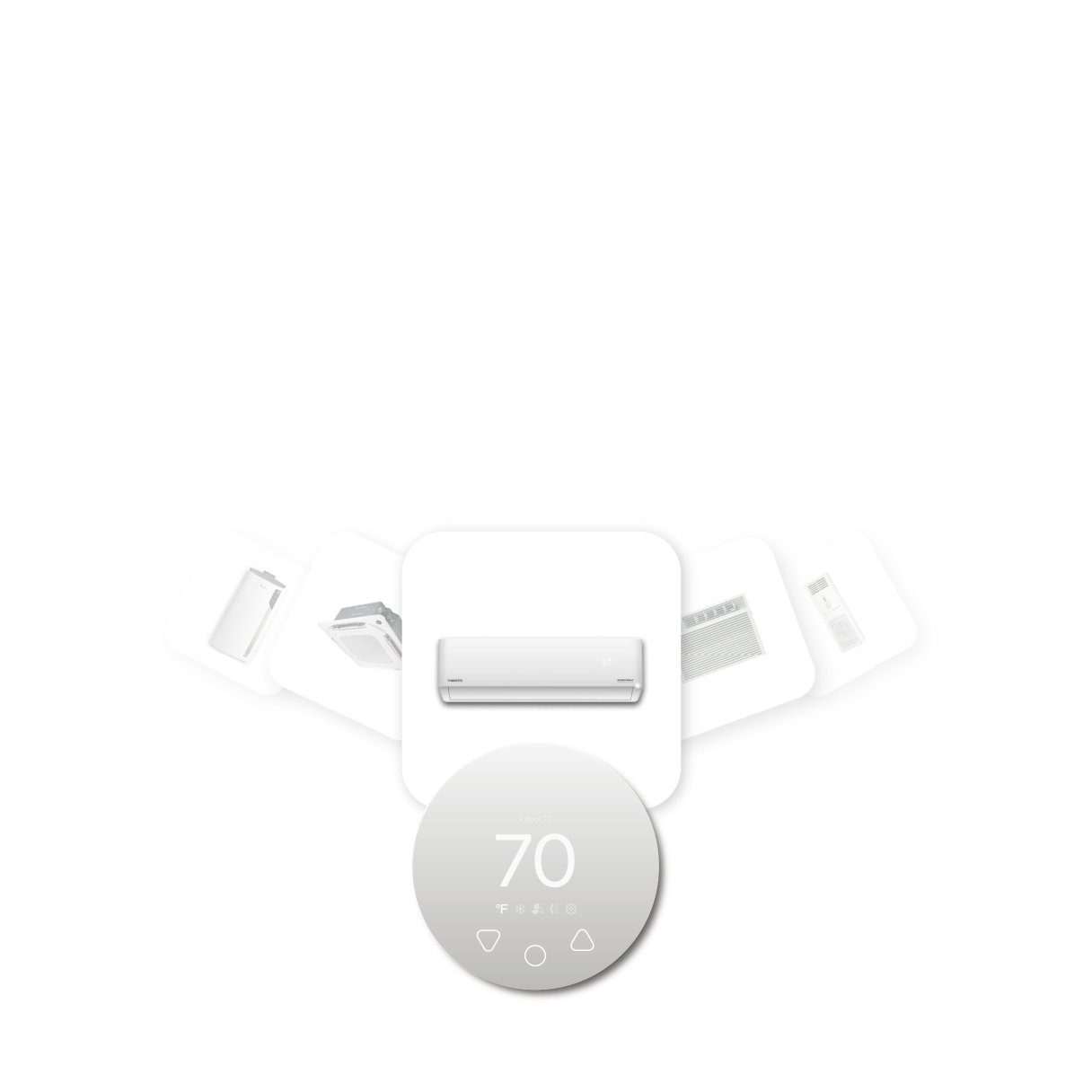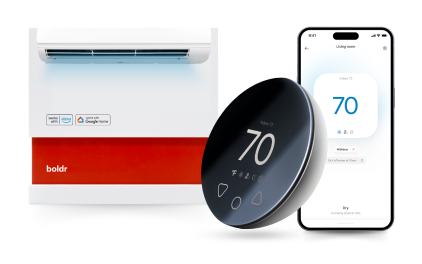
As more homeowners move toward energy-efficient heating and cooling, ductless mini-splits are becoming a go-to solution. Globally, the ductless mini-splits market was valued around USD $16.55 billion in 2024 and is expected to grow to $33.63 billion by 2033, reflecting an impressive 8.2% CAGR.
In the U.S., single-zone mini-splits dominate the residential market, especially for homes without existing ductwork.
With this rise, more homeowners are asking: Which smart thermostat works best with ductless A/C systems?
Popular models like the Google Nest and Ecobee have revolutionized HVAC control — but they’re designed for traditional, ducted central systems. For mini-splits and ductless A/C’s, they fall short without extra adapters and complicated setups.
Klima is a smart thermostat built specifically for ductless systems like mini-split’s. Below, we’ll compare Nest vs Ecobee vs Klima to help you decide which is right for your home.

What Is the Nest Thermostat?
The Google Nest Thermostat is one of the most recognized smart thermostats on the market. It’s designed to learn your temperature preferences over time, automatically adjusting heating and cooling to optimize comfort and energy efficiency.
Nest uses algorithms to adapt based on your schedule, occupancy, and local weather, helping reduce energy use without sacrificing comfort. It connects via Wi-Fi and integrates seamlessly with Google Home, Matter, and Alexa.
However, there’s a catch:
Nest is primarily designed for traditional central HVAC systems — not ductless mini-splits.
Mini-splits use infrared (IR) or proprietary communication signals rather than the standard 24V wiring Nest depends on. To use Nest with a ductless unit, you’ll need special adapters or custom wiring, which can be costly, complex, and unreliable.
Even with these add-ons, many users report that Nest can’t control advanced mini-split features like fan speed or vane direction.
Pros
- Sleek design and intuitive interface
- Learns your habits automatically
- Integrates well with Google smart home systems
Cons
- Not natively compatible with mini-splits
- Requires wiring and adapters
- Limited control over ductless features

What Is the Ecobee Thermostat?
The Ecobee Smart Thermostat is another major player in the smart home market. Like Nest, it’s built to control central HVAC systems using wired connections.
Ecobee devices connect to Wi-Fi and integrate with Amazon Alexa, Apple HomeKit, Google Assistant, and Samsung SmartThings.
When it comes to mini-splits, however, Ecobee faces the same challenge as Nest:
It’s not directly compatible with most ductless systems.
To connect an Ecobee to a mini-split, homeowners need a third-party adapter or thermostat interface, installed by a professional. This can cost extra, and often limits functionality, since mini-split manufacturers use proprietary control signals.
Klima - Smart Home Thermostat for Mini-splits, Air Conditioners and Heatpumps
Compatible with all brands of ACs and Mini-Splits Automate Climate Management Control remotely Reduce Energy Consumption Monitor bills in realtime
Try Now
Pros
- Excellent integration with multiple smart home ecosystems
- SmartSensors for multi-room comfort
- Detailed energy reports and analytics
Cons
- Not designed for mini-splits
- Installation requires wiring and professional help
- Expensive compared to ductless-specific options

Klima: The Smart Thermostat Built for Ductless Systems
The Klima Smart Thermostat offers a purpose-built solution for mini-splits, window A/Cs, portable A/Cs, and heat pumps.
Unlike Nest or Ecobee, the Klima Smart Thermostat uses infrared (IR) to communicate directly with your ductless A/C — just like your original remote. That means no adapters, no wiring, and no professional installation needed.
Klima Smart Thermostat is compatible with major brands like Mitsubishi, Daikin, Fujitsu, Toshiba, LG, Panasonic, and many more. Setup takes minutes: connect Klima via Wi-Fi, point it at your unit, and start controlling your system through the Boldr Energy app or voice assistants like Alexa, Apple HomeKit, Google Assistant and Google Home.
Pros
- Designed specifically for ductless and mini-split systems
- Quick, wire-free installation
- Affordable and easy to use
- Integrates with Alexa and Google Home
Cons:
- Only compatible with ductless A/C’s that have a remote with a display
Feature-by-Feature Comparison
|
Feature |
Nest |
Ecobee |
Klima |
|
Type |
Smart thermostat for central HVAC
|
Smart thermostat for central HVAC |
Smart controller for ductless A/Cs, mini-splits, window & portable units |
|
Connection |
Wired (C-wire or adapter)
|
Wired (C-wire or adapter) |
Wireless (Wi-Fi + IR signal) |
|
Works with Mini-Splits? |
Only with special adapters
|
Only with special adapters |
Native compatibility |
|
Smart Home Support |
Alexa, Apple HomeKit, Google, SmartThings
|
Alexa, Apple HomeKit, Google, SmartThings |
Alexa, Apple HomeKit, Google Assistant and Google Home |
|
Installation Difficulty |
Moderate (wiring required)
|
Moderate (wiring required) |
Very easy (plug & play) |
|
Ideal For |
Ducted HVAC, furnaces
|
Multi-zone ducted HVAC |
Ductless A/C’s like Mini-splits, window A/Cs, portable A/Cs |
Conclusion
If you’re controlling a ducted central HVAC system, both Nest and Ecobee remain solid choices. They offer deep integration, energy reporting, and smart learning features.
However, for ductless mini-splits, Klima Smart Thermostat is the clear choice. It’s purpose-built for your ductless system, affordable, easy to install, and offers seamless control without adapters or wiring headaches.
As ductless systems continue to dominate the market, choosing a thermostat designed specifically for them, like Klima Smart Thermostat, ensures maximum comfort, compatibility, and energy savings from day one.



















